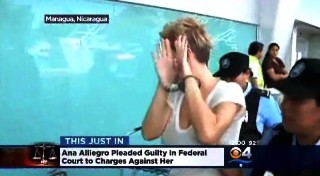|
Article Courtesy of The Miami
Herald
By Marc Caputo, Jay Weaver and Patricia Mazzei
Published
August 21, 2014
Miami congressional candidate and ex-U.S. Rep. David Rivera was officially named as the target of a federal investigation Tuesday when his friend pleaded guilty to criminal campaign-finance violations in open court.
Rivera’s name wasn’t disclosed by his friend, Ana Alliegro, who admitted she helped break campaign-finance laws and then lied about it.
Rivera, instead, was identified by a prosecutor who confirmed the Republican politician was “Co-conspirator A” in an $81,000 campaign-finance scheme to prop up a little-known candidate who used the illegal cash to trash a rival of Rivera’s.
“Why do we keep not naming the co-conspirator?” U.S. District Judge Robert Scola asked Assistant U.S. Attorney Thomas Mulvihill. “We’re past that time.”
Mulvihill pointed out that U.S. Justic Department policy forbids prosecutors from naming unindicted co-conspirators.
Rivera’s ties to the case have been reported by the Miami Herald and El Nuevo Herald for years, but he had denied wrongdoing. Heading into the Tuesday GOP primary for |
|
 Watch
VIDEO Watch
VIDEO
A federal prosecutor identified former congressman David Rivera as a co-conspirator in a campaign-finance scheme to prop up a little-known candidate in the 2012 Democratic primary.
|
Congressional District 26, Rivera had also denied being the target of any investigation.
But Judge Scola wanted Mulvihill to leave no doubt and directed him to name names.
About three minutes later, Mulvihill made the first of six direct mentions of Rivera, who is suspected of also helping Alliegro leave the United States for Nicaragua when she was supposed to be cooperating with prosecutors.
“In early April 2012, the defendant, Ana Alliegro, met at the Catch of the Day Restaurant with Congressman David Rivera and another individual,” Mulvihill said.
“At that point David Rivera directed Ana Alliegro to meet with Justin Lamar Sternad to assist, and she then met with Justin Lamar Sternad.”
Rivera declined to comment Tuesday.
The extraordinary scene that played out in federal court — and the steady drip of information showing the prosecution’s arsenal of evidence — underscores the strength of the case the government is trying to build against Rivera. At least five people, including Alliegro, could testify about Rivera’s alleged involvement.
Rivera has survived separate state and federal probes, respectively by the Florida Department of Law Enforcement and the IRS, into his finances. However, a state judge recently determined that Rivera, as a state legislator, had broken state ethics laws over the way he spent campaign and state money. The state ethics commission has yet to make a final ruling.
In the Sternad-Alliegro case, the prosecution indicated that Rivera was the mastermind. Mulvihill said that, after Alliegro met with Rivera, she then approached Sternad, an unknown Democrat running against Joe Garcia in the Democratic primary for the seat extending from Kendall to Key West.
Sternad, a hotel night-desk clerk, was raising five kids and was so financially strapped that he was on food stamps and took the bus to work.
Alliegro “told him that she had connections to provide the financing for his campaign. Since, as I told you, he was an extremely poor man, he agreed to accept it, took it as a lifesaver,” Mulvihill said.
Sternad used the money to rent a car, pay his cellphone bill, phone voters with pre-recorded calls and produce mailers, at least one of which attacked Garcia, who went on to beat Sternad and then Rivera.
During the primary campaign, the Miami Herald and El Nuevo Herald noted Sternad’s suspicious campaign activities and pointed out his incomplete campaign-finance reports. Campaign vendors, three of whom had been used by Rivera in previous campaigns, told the Herald that Rivera was behind Sternad’s candidacy.
Alliegro helped Sternad fill out his campaign finance reports, where he lied about the source of the illegal campaign cash, claiming the expenditures were from personal loans from his own account.
Sternad was later indicted for his role in the conspiracy and was recently given a seven-month prison sentence.
Alliegro faced similar charges. She pleaded guilty to four counts of making a false statement, conspiring and making illegal campaign contributions.
“She always said she would not invoke the Fifth Amendment, and that she would tell the truth,” said one of Alliegro’s defense attorneys, Richard Klugh. “And she intends to do that if called upon.”
She faces a maximum five years in prison, though that penalty would likely be lower if she cooperates in the case against Rivera. Her sentencing has been scheduled for Sept. 10. The informal plea deal announced in court indicates Alliegro, who has been incarcerated for nearly six months, could spend as little as six more months under house arrest.
Had Alliegro fought the case, she could have faced far more time behind bars.
There was no official plea agreement struck with the government, according to prosecutors and defense attorneys Klugh and John Bergendahl. Klugh said Alliegro chose to change her plea of her own volition.
“The federal system rewards and recognizes the importance of responsibility and telling the truth,” Klugh said.
When asked if his client was used by Rivera in the campaign-finance scheme, Klugh didn’t comment.
Mulvihill would not say whether Alliegro is cooperating with the investigation against Rivera.
And though Mulvihill did all the talking about Rivera, Judge Scola wanted to make sure Tuesday that Alliegro backed up the story.
“Ms. Alliegro,” Scola said, “do you agree that if there was a trial, the Government would be able to put on evidence to establish those facts?
Alliegro gave a one-word reply: “Yes.”
TRANSCRIPT
COURT HEARING
|
